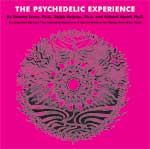|
|
 |
Dusted Reviews
Artist: Timothy Leary Album: The Psychedelic Experience Label: Locust Review date: Sep. 17, 2003 |

|
|
|
 |
In 1966, Smithsonian Folkways released The Psychedelic Experience, a recording of two lengthy readings by the ex-Harvard psychologist and infamously known “LSD-guru” Timothy Leary that were lifted from his own book, The Psychedelic Experience: A Manual Based on the Tibetan Book of the Dead. Leary designed the work to function as an audio instruction manual for LSD experimentation, with a passage entitled “Going Out” to be listened to as the LSD begins to take effect, and “Coming Back” to be listened to as the psychedelic’s effects begin to lessen. The effect is quite simple; both recordings feature the occasional striking of a bell, frequent bouts of distantly crackling silence, and the voice of Leary himself – seemingly beamed forth from a more comfortable, confident realm than our own. He intones in a voice that straddles a need to effect total serenity and an almost giddy conviction that he is single-handedly leaping over the Modernists’ void – that horrible, banal precipice of 20th century limitation.
“You are now about to begin… a great adventure… a journey out of your mind… You will travel far beyond familiar reality… into the level of transcendent awareness… You will leave behind you your ego… your beloved personality… which will be returned to you at the end of this voyage.” The Cliffs Notes version reads, “You will have your cake. You will eat it too.”
In its present form, The Psychedelic Experience arrives like much of Locust’s reissued output – as a key historical document that has lain mysteriously fallow. Its overt and acknowledged antecedents are in Zen Buddhism, Chinese Taoism, what Leary himself refers to as “Sacred Writings of the East.” Yet as a text, The Psychedelic Experience resonates much more convincingly with Transcendentalism, the American Renaissance – Puritan recasts dabbling in Eastern mysticism as a method of eclipsing the American quotidian. “Going Out” practically rips lines from Emerson’s “Nature,” with lysergic acid replacing the forest glen as the enabling factor in the “transparent eyeball” experience. Leary’s trip is an All-American one. His astonished leads are trails that were blazed on our soil centuries ago; they’re trails that have never gone cold.
Unlike 60s fixtures like Ken Kesey, Leary embraced a theory of “set and setting” – the belief that self-medicating in a controlled environment could be an effective safeguard against bad trips. Hence The Psychedelic Experience’s instructional format in general, and its written details concerning the preparation of the environment specifically (“The room should be kept free of distractions and interruptions, such as telephones, door-bells, everyday business to attend to, child-care obligations, etc.”). Like those Emersonian revisionists who preceded him, sometimes by a century or more, Leary realized the potential horrors connected to detaching oneself from “learned consciousness.” The difference with Leary was that he believed he could beat the bad trip. He was going to be the first to successfully spear the White Whale and rudder the Pequod safely back to port, and he was going to do it from the comfort of a living-room cushion. Acknowledging that “Coming Back” is a “crucial period,” Leary warns calmly against forming ominous imprints that might haunt the voyager in the days to come – apparently oblivious to the mind’s natural inclination to wander towards the obverse, the taboo, when the opportunity presents itself. Ultimately, there’s a rigidity and structure to Leary’s utopian travel itinerary that fluctuates between paradox and absurdity. You will have your cake and you will eat it too; You will emerge from the cocoon of your limited consciousness and reach deeply into the intergalactic net of 13 billion nerve cells, and if you arrange your living room to be “comfortable and aesthetically pleasing,” if you listen to The Psychedelic Experience while you travel, you will dock safely and be able to retrieve your carry-ons and personal items once the ride is finished. Rather than wrestle, Leary calmly instructs – it’s what makes his text fluctuate between a vital voice in an ancient debate and a quaint piece of 60s kitsch, a relic from a time whose optimism later went belly-up.
Reissued, The Psychedelic Experience functions convincingly as both a museum piece and a party gag. Tangentially related to the current stream of musical mysticism that another rag recently deemed “The New Weird America” (I have trouble imagining The Psychedelic Experience being reissued separately from that phenomenon), Leary’s philosophical and political aims are timely grist for the mill, as we continue to reel from our damaged, Clinton-era optimism. “Turn on, tune in, drop out” or start yelling?
By Nathan Hogan
|







